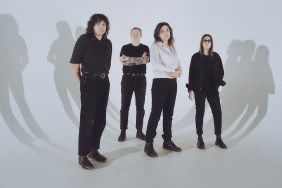Grand Salvo is the solo project of Melbourne musician Paddy Mann. His sixth studio album Slay Me in My Sleep is 1 of only 9 Australian releases to have made the 2012 Australian Music Prize Shortlist. Mann’s competition includes the likes of Flume, Tame Impala and Hermitude.
Yet no matter the outcome, Grand Salvo’s Slay Me in My Sleep is already a winner, striking a blow for any album where the whole is greater than the sum of its parts.
Slay Me in My Sleep is a concept album, a love story that weaves through time and imagination as a young would-be burglar becomes infatuated with a photograph of a young girl found in the house of an old woman he intended to rob.
The album is comprised of songs with titles such as She Quietly Makes Her Way Down the Stairs As He Rummages Away in the Room and With the Photograph Lying Between Them, She Tells Him Her Story and They Talk for a Long Time, with each track helping the narrative to unfold either though lyrics laden with detail or a fog of atmospheric intrigue.
As Mann explains, it is his intention to envelope the listener into a world both discernible and disorientating, which means the listener must commit to absorbing the album in full.
It’s for this reason that Mann is flattered to have been included on the AMP shortlist, and this is the reason why you should take the time to get lost in Grand Salvo’s Slay Me in My Sleep.
Music Feeds: Congratulations on Slay Me in My Sleep being selected to the AMP shortlist.
Grand Salvo: Thank you very much. It’s an exciting surprise.
MF: Did you expect that Slay Me in My Sleep would make the AMP shortlist?
GS: I didn’t have any anticipation of being nominated. I told Andrew [Khedoori] from the label [Preservation] that I didn’t think we should bother [entering Slay Me in My Sleep for the AMP] and he did it anyway. So I was very thankful for it… It’s quite a surprise; it’s very gratifying.
What I like most about it is knowing that the judges actually listened to the album like you kind of imagine people would when you’re making it, which is an unrealistic level of scrutiny… I guess these judges have to [delve into it] that much, so I quite like the idea of that. It’s a great honour.
MF: Would you say that this is the most recognition you’ve received from one of your albums?
GS: Yeah, probably; I guess it will be the widest recognition. I’m pretty much under the radar, I’d have to say, but I guess that’s a testament to [the album].
MF: What do you think it is about Slay Me in My Sleep that has resonated with listeners so strongly?
GS: Well, I guess even though it’s a concept album, I suppose it puts people off a lot of the time. I structured it so that it’s basically just an album of pop songs, so it’s quite accessible, but I guess as well as that there’s a whole other element to it [that you can] either ignore or explore if you want to.
If you choose to explore it, it does all make sense in a whole different way, because I worked pretty hard on making that aspect of it…
MF: With Slay Me in My Sleep, did you plan out the overall narrative before writing the actual songs or did you let the story unfold as the album came together?
GS: It’s a mixture. I had a very clear idea for what the album was going to be about, so I knew how the story was going to unfold. But there are always little details and scenes that pop up and make it stronger or slightly twist it so it’s more complex or interesting.
Most of the lyrics are written kind of in the last stages. [To] make a narrative span the entire album [and] make sense, it has to be planned like a short story or something, I suppose. You come into it with specific ideas about certain songs.
There are two songs on it that were preexisting songs that I tweaked a little bit to fit into the story. But 90% of it’s all been constructed specifically in aid of making the story work.
MF: The track What’s That in Your Pocket? dates back to when you were 17 years old. Does that mean that the idea for this narrative also stretches back that far?
GS: No, I just really like the idea of recruiting a song that I wrote when I was at the age of the boy, the protagonist in the story. Musically, in general over the whole album, I wanted there to be an innocence and exuberance, kind of the things you associate with being a teenager…
So I really wanted to have this silly little ditty I wrote when I was 17. I thought it would add to the atmosphere. I changed all the words; I can’t even remember what they were, but they would have been tremendously embarrassing.
MF: A different track, The Lament of the Regretful Ghost, has a muddy narrative that you’ve said you couldn’t decide exactly what it means. Why have an ambiguous song in a concept album that is telling a specific story?
I had the story pretty much pegged out. [But] you don’t really want to be too specific in order to become a little boring, and too sign-posted. And also, there’s a whole idea of time, and how we perceive time, running through it.
So I wanted the woman’s lover from the 20s, the one who’s only ever referred to a couple of times, I wanted to use his presence somehow. So I imagined some elements of that song [The Lament of the Regretful Ghost] from his perspective, as if he was some obscure third person watching somehow.
I wanted the idea of him being the old woman’s age as well, but also maybe the boy [the protagonist] having grown up and having become as old as the woman and thinking back to his experience as well. I wanted it to be a big temporal crossover mishmash of everything.
And they’re kind of abstract, supernatural concepts. So it’s got to spin around to make it the kind of atmosphere that adds another element, you know, muddies the water and adds atmosphere rather than just this happened, that happened. I think it can get pretty boring getting bogged down in the narrative lyrical content.
MF: Is that why on songs such as They Sit Facing Each Other… it was important that the album was pushing and pulling in a non-linear form of storytelling?
GS: Yeah, some songs switch from perspectives as well; sometimes from the old woman’s point of view, sometimes from the young boy’s point of view. I wanted that to be a little mixed sometimes because the characters, particularly the woman’s character, are dealing with the past…
I had enough songs that were very specific and really linear, so I definitely wanted to make more conflict, more like a puzzle or just something that invoked some kind of atmosphere, I guess that’s most important. You have to capture people’s imaginations or else it ends up being boring…
Those kinds of songs, I see them as a word-painting. They’re very abstract, almost from a third person’s perspective of the whole album. It’s kind of hard to explain, but it [They Sit Facing Each Other…] has stuff that helps the narrative and fills in some of the gaps.
It makes more sense of things, but also in itself it doesn’t read in any form that will make any linear sense. Musically and lyrically it works in fortifying the atmosphere and in terms of narrative, just kind of adding pieces to the puzzle.
It’s not in place, you have to put it in place yourself.
MF: Actors often become, at least in part, the characters they portray for a time. Was that something you experienced while writing and recording Slay Me in My Sleep?
GS: Well, I would that they [the characters] all should exhibit my characteristics, really. I mean the things you write songs about have to resonate within you. At least for me anyway, they have to make sense and they have to mean something to you, so you can actually believe in the songs.
So I think there are always aspects of myself that are amplified or used slightly or plucked out and placed in slightly different environments. I always like to imagine that I’m old and that I’m looking back on my present as I’m experiencing it.
It means you can be sentimental and nostalgic about something that happened that morning. I guess it’s a way of bringing out things that you are experiencing now in way that you usually do when you’re looking back on something and idolising things.
It’s a way of pretending you’ve lost everything that you have now, and therefore really appreciating everything that you’ve got in a very sweet and thankful way.
MF: A review in The Vine describes the album and your music as “so uncommonly natural that is becomes otherworldly” – would you agree with that statement?
GS: I guess I try to be natural; I think sometimes pretentiousness can really ruin music. But I think it works sometimes as well. I definitely try to be natural and I definitely try and create another world. I definitely try and create a little world that someone can enter when they listen to the album.
A little world as in when you’re watching a movie that works, you kind of forget you’re watching a movie for a while. You get pulled into the world of the movie, and I would like that to happen to people when they listen to the album. Ideally that’s how I’d like everyone to experience it.
But I don’t know if that’s uncommon. I guess I’m agreeing that it’s what I aspire to do. It’s worked for the reviewer anyway.
MF: Do you think that’s a reflection on modern day music, in the sense that you’ve written a character-based concept album and it comes across as authentic expression; whereas some musicians will sell their work as authentic expression, but in reality it’s the heightened, dramatised emotion of a specific character?
GS: I just think it’s hard to say whether music is real and whether it’s just, I think it’s really hard to tell. I mean, maybe because I’ve been around for so long and doing the same thing, maybe that suggests that I’m now authentic.
Sometimes you can tell, something on the surface might be quite throwaway [with] nonsense lyrics that are obviously made up at the last minute. But there’s something about that music that’s real and it’s all coming together. And everyone who’s involved in it knows it is, only on a subconscious level and a feeling, and that happens sometimes…
But then you get bands who try really hard and labour away at making a very meaningful album or song and just fall flat, maybe because they tried too hard. You’ve got to try hard in directions that aren’t hammering away at the final product. You kind of have to deal with your album out of the corner of your eye and look at it closely or it’ll disappear under your scrutiny. It’s a weird process.












